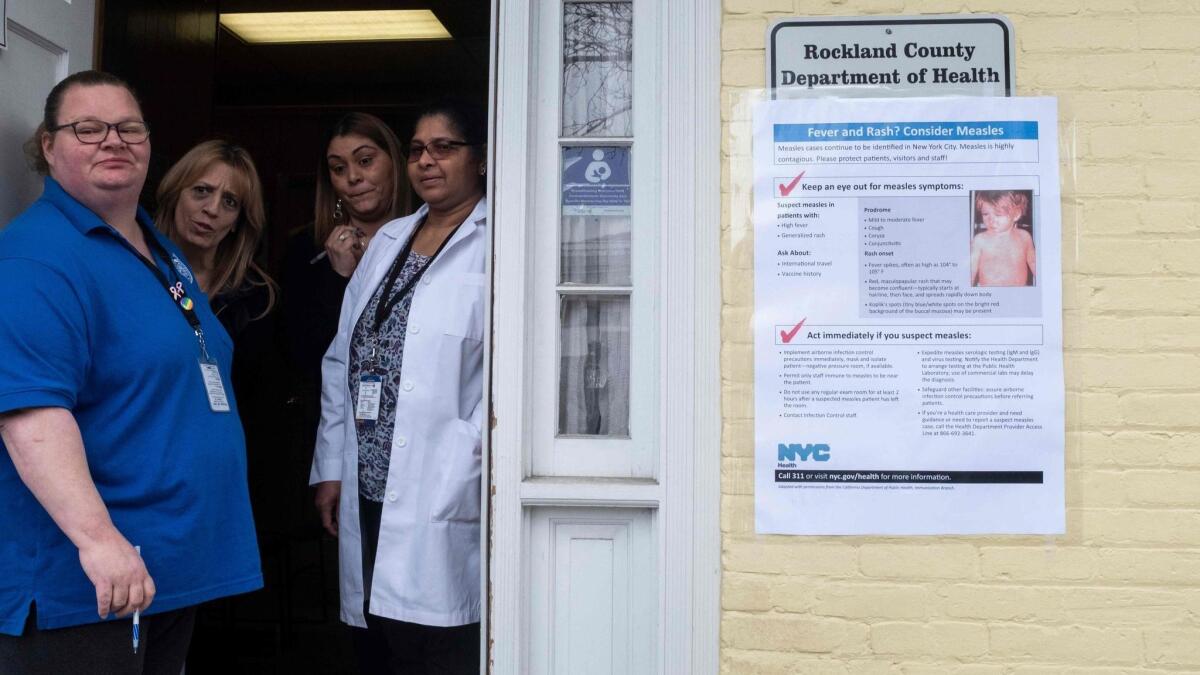Why the measles outbreak has roots in today’s political polarization
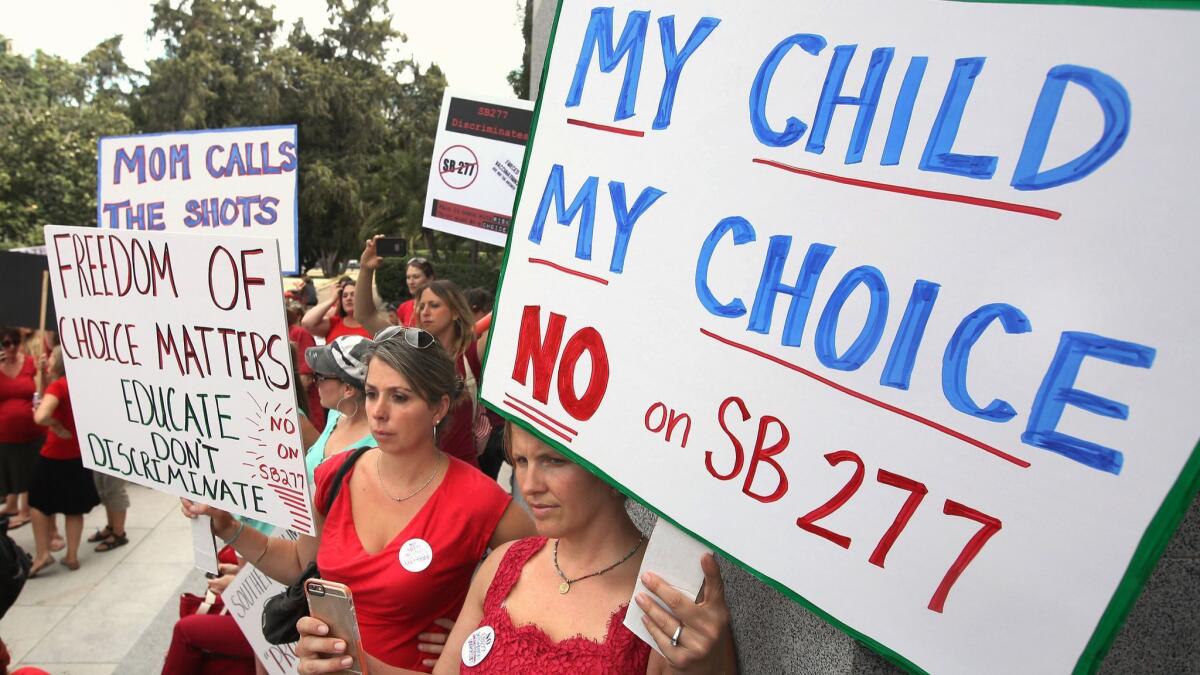
- Share via
Seizing our newborn infants,
Blighting their lives with pain;
Filling their veins with poison,
Tainting each tender brain.
So go the lyrics of “Anti-Compulsory Vaccination Hymn,” circulated not by the modern-day anti-vaccine band the Refusers but by the Anti-Vaccination Society of America. The group’s members campaigned against the lifesaving smallpox vaccine in the late 1800s, a turbulent time when a nation grappling with the aftermath of slavery responded with “black codes” and Jim Crow laws that pushed a divided society even further apart.
Sound familiar?
Vaccine resistance in America has frequently coincided with periods of great angst and resentment toward a government that seems bent on micromanaging citizens’ lives. As the country faces the largest outbreak of measles since the disease was deemed eliminated in 2000, epidemiologists and medical ethicists say they are not surprised to see an us-versus-them mentality fueling the rise of vaccine opponents once again.
“This is a broader symptom of distrusting our institutions,” said Richard Carpiano, a medical sociologist at UC Riverside.
Those who object to the measles vaccine aren’t just questioning the safety of the shot. They’re challenging the state’s authority to require it.
“It’s no longer a lack of trust in the vaccine, but the vaccinator,” Nicholas Evans, a bioethicist at University of Massachusetts Lowell.
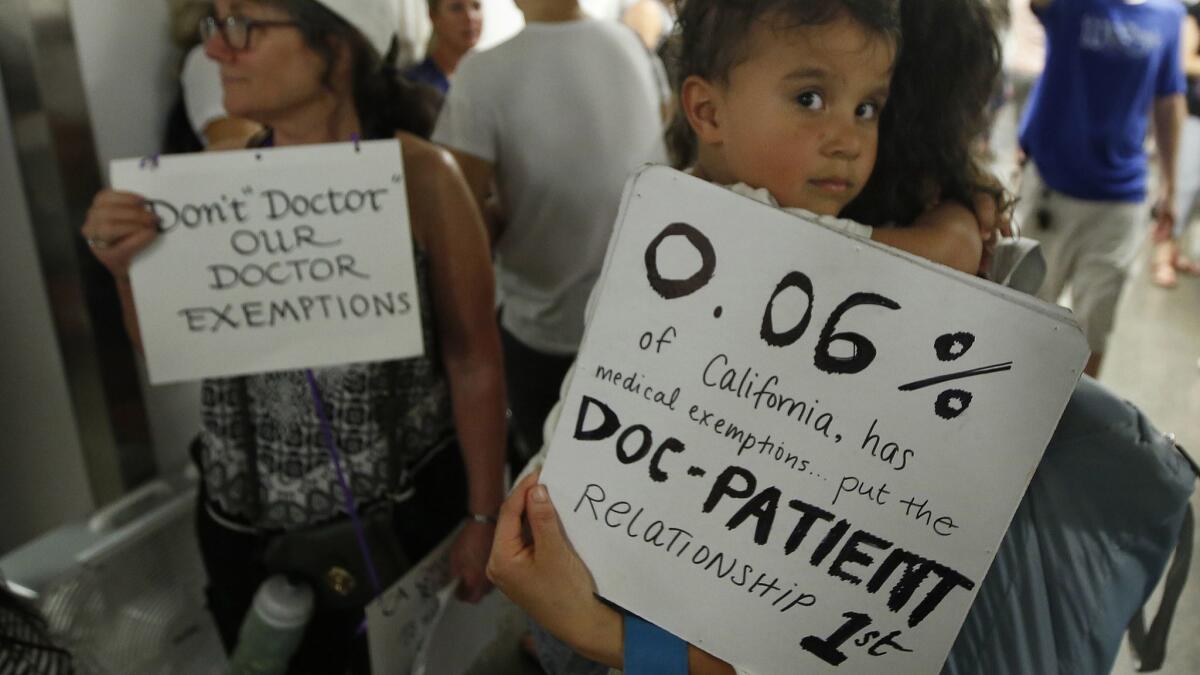
At least 764 people in 23 states have contracted measles in 2019, according to the Centers for Disease Control and Prevention. About half of those sickened have been children younger than 4.
An infection is never an individualistic affair. The virus that causes measles is more contagious than Ebola or Zika, and it remains suspended in the air for two hours after an infected person has coughed or sneezed. To prevent a single case from ballooning into an outbreak, 90% to 95% of the population must be immunized.
“It’s that simple: The more that are vaccinated, the more people who will be saved,” said Gil F. Chavez, deputy director of the Center for Infectious Diseases at the California Department of Public Health.
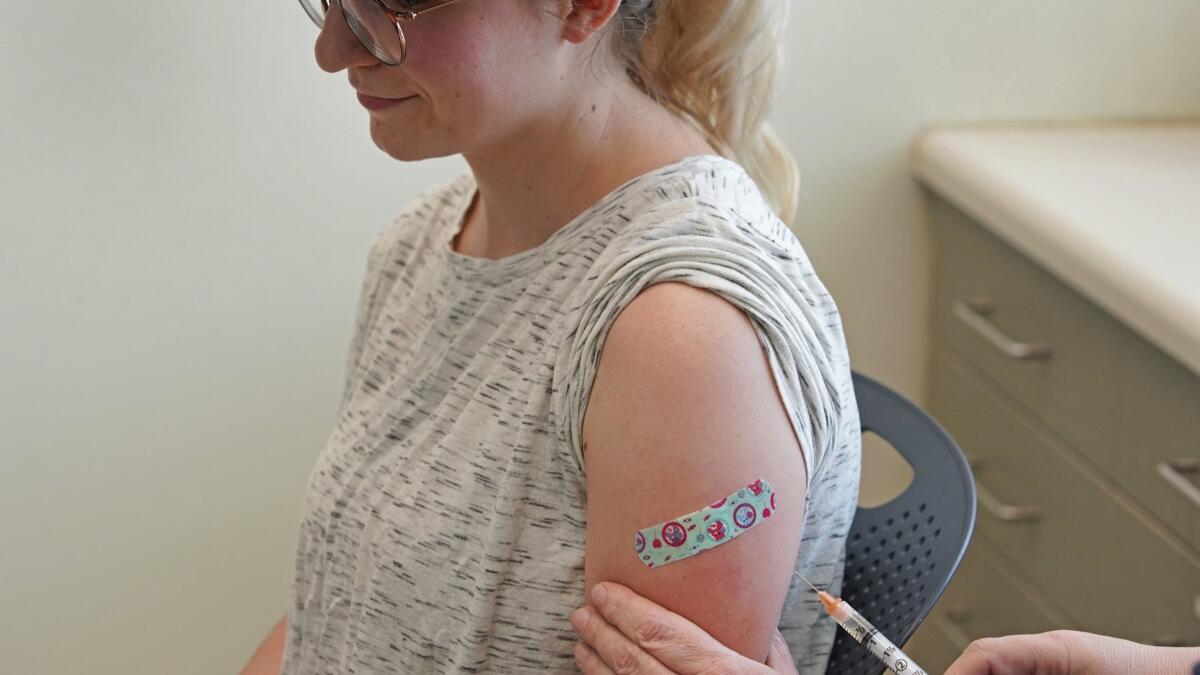
There have always been pockets of vaccine resistance. But today they can be found on both ends of the political spectrum.
“There’s the liberal ‘I define what’s healthy for me’ people, and the conservative ‘the government can’t tell me what to do’ view,” said Dr. Daniel Sulmasy, a bioethicist at Georgetown University. “They come together in very American ways.”
Perhaps no part of the country typifies the liberal objection to mandatory vaccines better than the Pacific Northwest, where hundreds of activists rallied at the Washington state Capitol with posters that proclaimed “My child, my choice.” Many parents with a strong commitment to abortion rights and an organic lifestyle believe a bout of measles, like chickenpox, is a time-honored childhood rite of passage.
About 2,800 miles and many ideological degrees away, ultra-Orthodox Jewish families in New York’s Rockland County are citing “individual autonomy” and “free exercise of religion” as reasons for refusing mandatory vaccinations. Despite 224 measles cases and counting in that outbreak, the conservative community bristles at the government’s attempt to interfere in their lives.
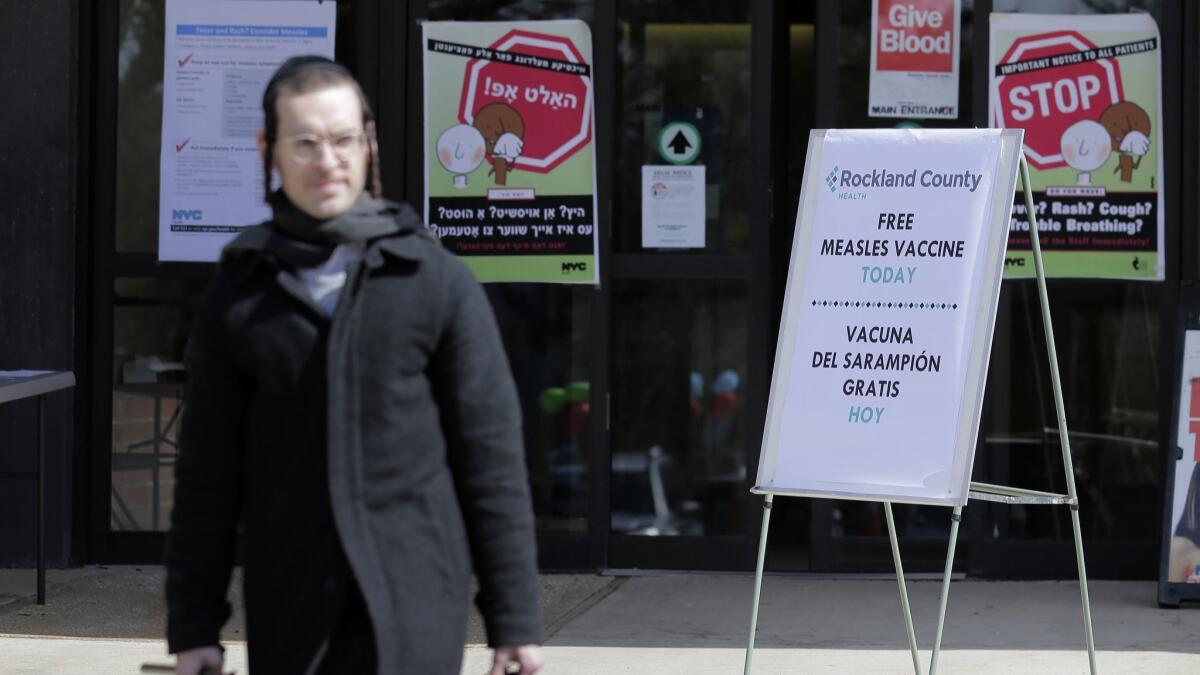
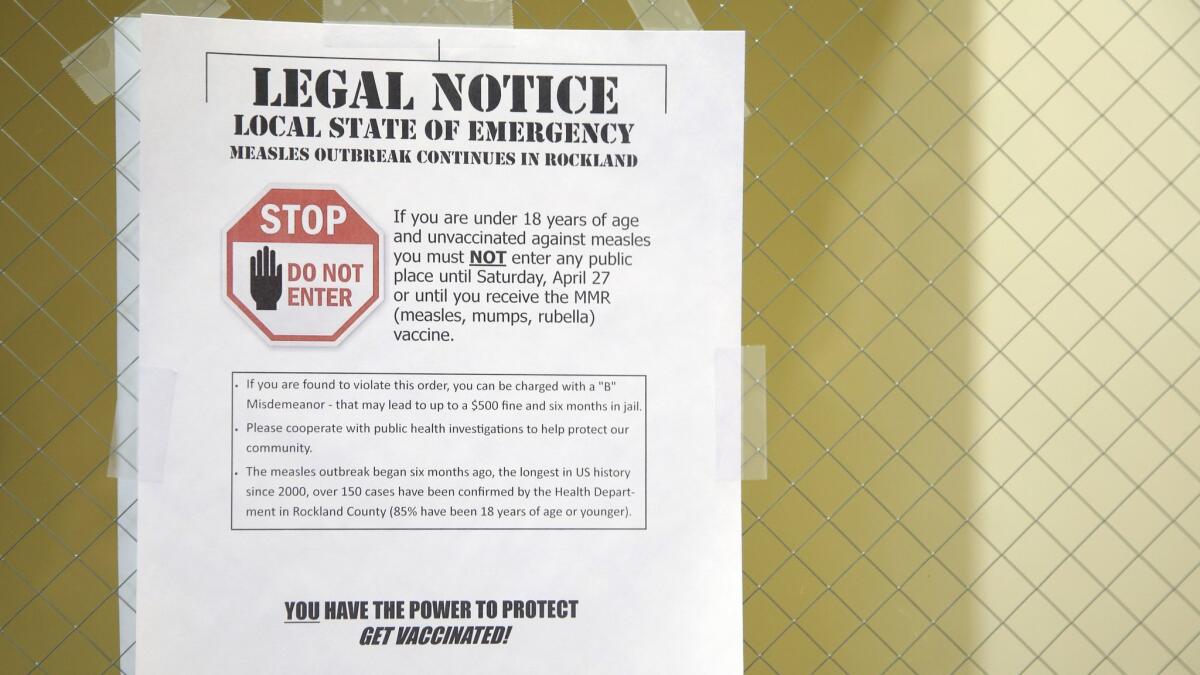
Public health authorities have long restricted individual liberties for the sake of the common good. Smoking is prohibited in most public spaces. Tuberculosis patients who refuse medication can be forcibly detained.
That thinking holds for vaccines as well. In 1905, the U.S. Supreme Court ruled against a father in Cambridge, Mass., who was fined $5 for refusing to have his son inoculated against smallpox. The court’s 7-2 opinion made clear that states have the authority to mandate vaccinations because society bears the cost when people opt out.
But anti-government sentiment tends to flourish when the fabric of society is frayed, as it is now. Civic discord undermines faith in public institutions, including the Centers for Disease Control and Prevention and the Food and Drug Administration.
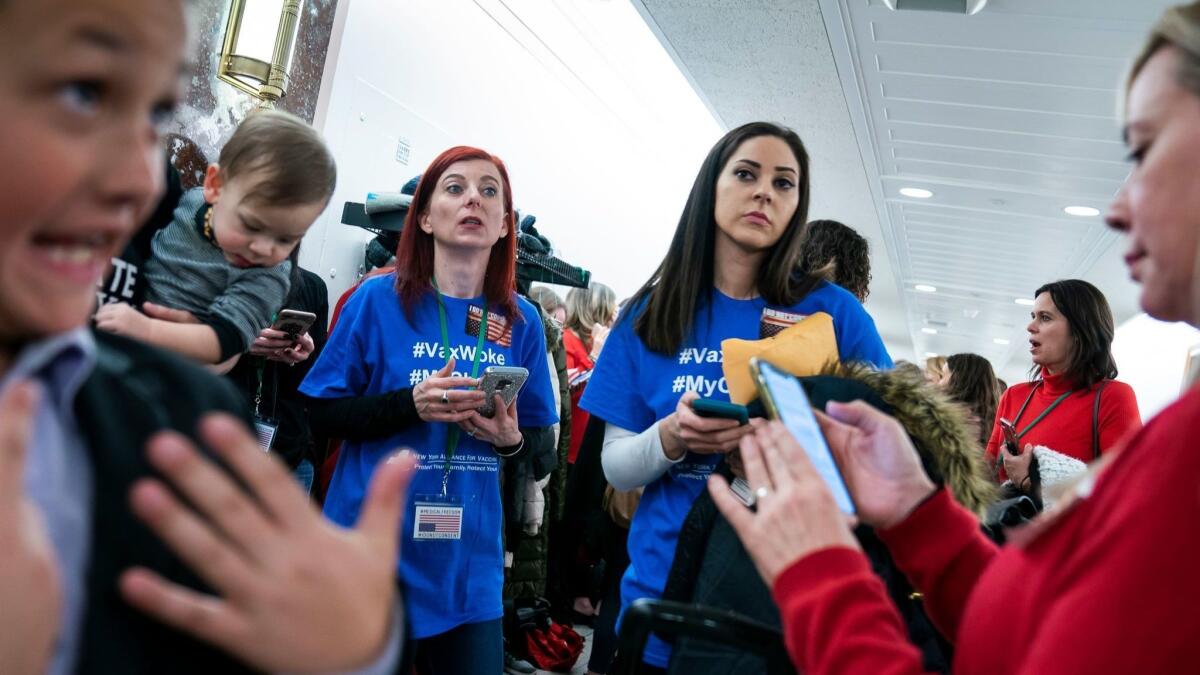
Americans are now more polarized in their views on a variety of core issues than they’ve been in at least 25 years, according to the Pew Research Center. This tension helps explain why resistance to the measles vaccine is so strong.
“Right now, we seem to be fighting about just about everything,” said Elena Conis, a public health historian at UC Berkeley. “Compulsory vaccination is no longer simply a medical act; it’s a political act.”
This division provides fertile ground for activists. For example, a group called Parents Educating and Advocating for Children’s Health, or PEACH, has been working to influence Orthodox Jews with conference calls and handbooks that accuse the government of exaggerating the benefits of vaccines while lying about the risks.
On its website, PEACH says it “supports religious, philosophical, and medical choice,” and that it isn’t “‘anti’ anything.” But it does offer parents a simple form to request vaccine exemptions, which drive down vaccination rates. In Rockland County, about 28% of children were unvaccinated as of earlier this year, according to state health officials.
The technique has worked before. After anti-vaccine activists visited a cluster of Somali immigrants in Minnesota, the number of children who received the MMR vaccine for measles, mumps and rubella dropped from 92% to 45% over a decade, according to state’s health department. A subsequent measles outbreak in 2017 sickened 79 people.
How stricter vaccine laws spared California from a major measles outbreak »
Other politically conservative regions of the United States are at risk. In Texas, the number of children with personal belief exemptions increased from 3,000 in 2003 to more than 56,000 in 2018. In Arizona, lawmakers have pushed back on vaccine enforcement legislation, including one who called it “communist.”
“It’s the rise of individualism,” said bioethicist Arthur Caplan of New York University’s Langone Medical Center. “That’s Trumpism — that’s what the president represents.”
Indeed, President Trump has endorsed the discredited idea that the MMR vaccine causes autism. Before taking office, he held high-profile meetings with prominent anti-vaccine activists.
But as the number of measles cases passed 700, the president revised his stance. “The vaccinations are so important,” he said on the White House lawn last week. Children “have to get their shot.”
Individualism also motivates those on the left whose aversion to authority is reminiscent of the turbulent 1960s and ’70s, Evans said. They are asking the same questions about vaccines that feminists once asked about birth control pills: Are they necessary? Are they safe?
The sentiment is apparent in the school records of Clark County, Wash., the epicenter of an outbreak that sickened 71 people. Nearly 1 in 4 kindergartners began the 2017-18 school year without all their recommended shots, according to state health department data. After a bill to end philosophical exemptions to vaccines passed the state Senate in April, some residents vowed to move elsewhere if the measure became law.
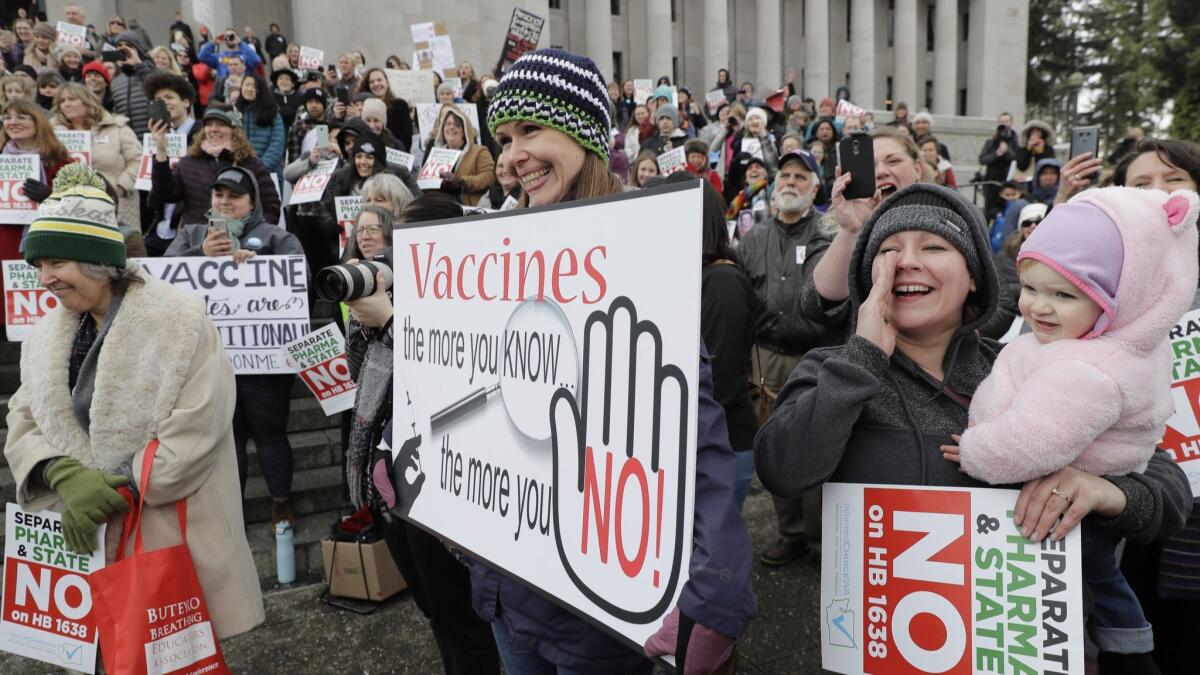
Those anti-establishment attitudes are often grounded in the conviction that individuals know better than experts, who may be in the pockets of pharmaceutical companies and therefore discount the healing power of “fresh air and exercise,” Caplan said.
“You’re going to hear, ‘Nature wouldn’t give us challenges we couldn’t handle,’ which I find hilarious, because nature is trying to kill us about 80% of the time,” he said.
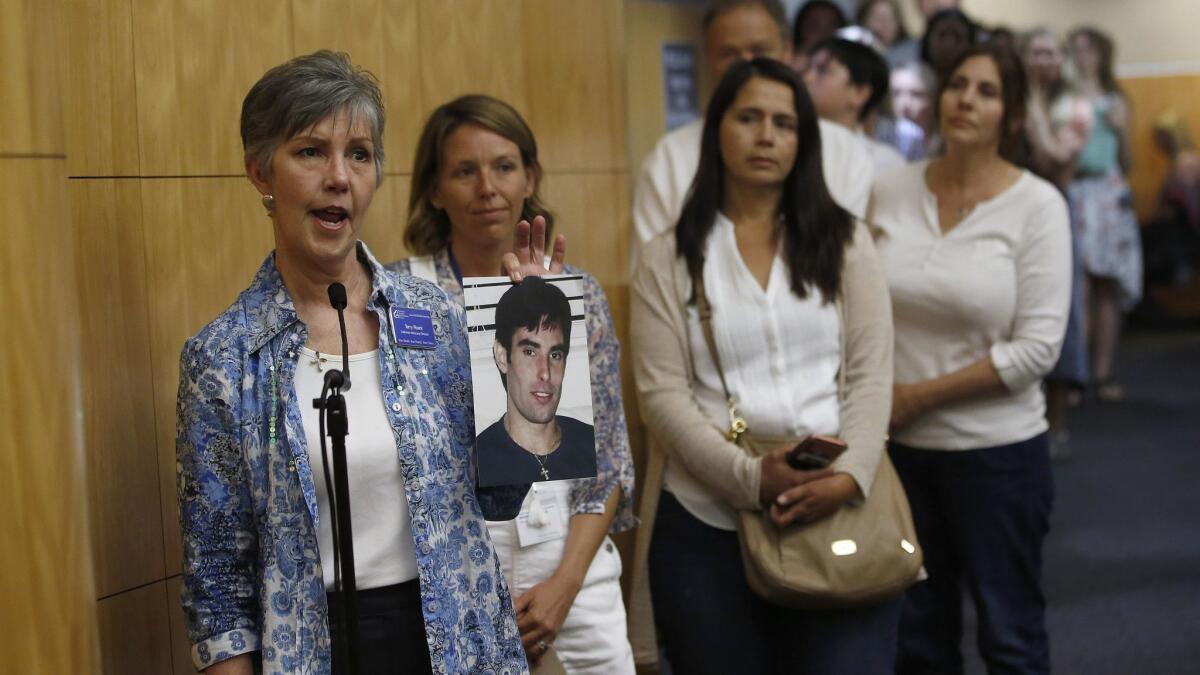
Political and social upheaval have gone hand in hand with the most raucous spans of anti-vaccination culture — beginning with the era of the hymn about injecting poison into newborns.
After the Civil War, the federal government flexed its power over states to protect the rights of African Americans. When Reconstruction ended and that force was withdrawn, the backlash sparked a wave of individualism.
It was hardly an ideal climate for the doctors and drugmakers promoting smallpox vaccines in the early 1900s. Although the disease was killing about 1,500 Americans each year, skeptical families didn’t see a need for the shot. Outposts of the Anti-Vaccination Society of America and similarly named groups sprang up in several states, and their members helped overturn mandatory vaccination laws from California to West Virginia.
A fresh wave of resistance arose in the 1970s, fueled by the zeitgeist of the counterculture that “encouraged Americans to question authority and traditional sources of expertise,” Conis said.
The environmental movement taught people to be skeptical of the chemicals in their everyday lives, and advocates for reproductive rights encouraged women to exercise authority over their bodies rather than let lawmakers make decisions for them.
“Women pushed back against patriarchy. Environmentalists pushed back against industry. Patients pushed back against doctors,” Conis said. “When you put those movements together, you get a skepticism on the left, which bubbles up and combines with the long-held anti-vaccination views of libertarians on the right.”
The CDC missed its goal of eradicating measles in the U.S. by 1982. Other failed attempts followed. “Whenever political support went away, the cases tended to tick back up again,” she said.
Health officials finally succeeded in 2000, but that victory is now in jeopardy. Experts fear measles outbreaks will continue until Americans return to the middle ground where facts are trusted and expertise is valued.
“In a politically polarized country,” Conis said, “vaccination is as charged and divisive as any other issue.”
